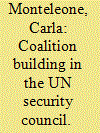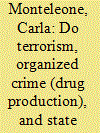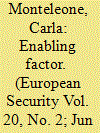| Srl | Item |
| 1 |
ID:
138082


|
|
|
|
|
| Summary/Abstract |
Political coalitions in the international system are still understudied in International Relations theory. This article claims that the formation of and variations in coalitions in the international system are affected by changes in their bargaining power and bargaining environment related to the global leadership cycle and by long-term organisational changes of the international political system. Identifying the Security Council as the institution in which states are more likely to keep their systemic preferences at the institutional level, the article studies the presence, formation and change of coalitions in the international system by testing variations in the behaviour of the Security Council members in the period 1993–2012. To overcome methodological difficulties, it proposes to analyse sponsoring rather than voting behaviour. In the analysed period, the presence of a mutating dominant coalition, signs of potential coalitions in the making and an increase in participation and competition resulting from modifications in the organisational form of the international system are found.
|
|
|
|
|
|
|
|
|
|
|
|
|
|
|
|
| 2 |
ID:
143656


|
|
|
|
|
| Summary/Abstract |
In 2014, the UN Security Council emphasized the dangers of terrorism, criminal activity (especially drug production and trafficking), and state weakness in conflict areas. However, neither policy debates nor scholarly analyses have focussed on the potential impact of these elements on conflict dynamics and characteristics, and the investigated partial relationships have led to inconclusive results. This article explores the presence in armed conflicts of terrorist groups among fighting parties, major drug production (indicating the presence of activities typical of criminal organizations), and state failure in the period 1990–2011. Focussing on intrastate conflicts, this article highlights that, while when they are isolated their impact on armed conflicts is limited, when the three factors are simultaneously present, the interactions among them create a sort of threshold effect capable of affecting conflict characteristics and, in particular, conflict duration and incompatibility.
|
|
|
|
|
|
|
|
|
|
|
|
|
|
|
|
| 3 |
ID:
108664


|
|
|
|
|
| Publication |
2011.
|
| Summary/Abstract |
The article analyzes the influence of US-EU cooperation on the UN decision-making process in the area of peace operations and its impact in the period 1991-2008. The article claims that US-EU cooperation transforms the positional power of the US, the EU and its member states into a coalition with dominant influence in the area of UN peace operations and becomes an enabling factor for the authorization of UN peace operations.
|
|
|
|
|
|
|
|
|
|
|
|
|
|
|
|